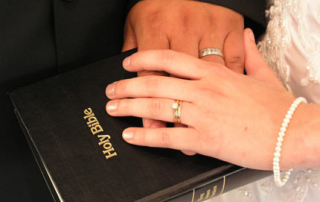1 Corinthians 7:14 (ESV), “For the unbelieving husband is made holy because of his (believing) wife, and the unbelieving wife is made holy because of her (believing) husband. Otherwise, your children would be unclean (sinners under condemnation, unjustified, unrelated to God, aliens from His care and blessing), but now are they holy.”
We know the disobedience and alienation of Adam and Eve from the Heavenly Father brought alienation to all their offspring. In a similar manner, the reconciliation of the Lord’s people through belief in Jesus, brings them and (to a degree) their families back into harmony with God. Their children are counted as justified through their parents, up to the time when the child shall have a mature will of its own.
The unbelieving spouse also benefits from the believer’s status as a child of God. The redeemed are “…led by the Spirit of God, they are the sons of God.” Romans 8:14. The fully consecrated Christian is promised God’s fatherly protection, provisions, answered prayer, and more. In some respects, God’s care may be looked at like an umbrella over the believer. The spouse indirectly receives God’s blessings as long as he stays under the Christian wife’s umbrella.
For example, as a Christian woman grows in the holy Spirit, she develops a balanced mind, more love, and courage. “God has not given us a spirit of fear, but of power and of love and of a sound mind.” 2 Timothy 1:7. So when the couple faces tough life experiences, the non-Christian spouse may be strengthened and guided indirectly by the believer’s balanced thinking and love.
The Apostle Peter instructs Christians, “to live holy and godly lives.” 2 Peter 3:11 (ESV). Whether or not the unbeliever chooses to appreciate the “holiness” of the believer is his choice. So, to the degree the spouse submits to God’s holy care, is the same degree to which that one will be holy.
Finally, if the questioner is asking whether a non-believing spouse can receive salvation through the believing spouse, that answer is no. The decision to accept Jesus as one’s Savior and to submit one’s will and life to God is always individually made. This decision is only between God and that person.














